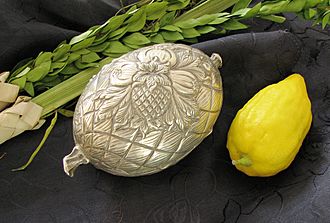Sukkot facts for kids
Quick facts for kids Sukkot |
|
|---|---|

|
|
| Official name | Hebrew: סוכות or סֻכּוֹת "Booths, Tabernacles" |
| Observed by | Jews |
| Type | Judaism |
| Significance | One of the three pilgrim festivals |
| Observances | Eating in sukkah, taking the Four Species. |
| Begins | 15th day of Tishrei |
| Ends | 21st day of Tishrei (22nd outside of Israel) |
| Date | Lua error in Module:Wikidata at line 132: attempt to index field 'wikibase' (a nil value). |
| Related to | Shemini Atzeret |
Sukkot (also known as the Feast of Tabernacles) is an important Jewish festival. It is a time when people celebrate the end of the harvest season. The holiday also remembers a special time in history. Long ago, Jewish people lived in the wilderness and built small shelters. They had no permanent homes then.
What is Sukkot?
Sukkot is one of the three main Jewish holidays. These holidays are called "pilgrim festivals." In ancient times, Jewish people would travel to Jerusalem for these events. Sukkot is a happy time that lasts for seven days.
When is Sukkot Celebrated?
Sukkot begins on the 15th day of the Hebrew month of Tishrei. This usually falls in September or October. The holiday lasts for seven days in Israel. Outside of Israel, it lasts for eight days.
The Sukkah: A Special Hut
A big part of Sukkot is building a sukkah. A sukkah is a temporary hut or booth. It reminds Jewish people of the simple shelters their ancestors used. These shelters were built when they traveled through the desert after leaving Egypt.
Building Your Sukkah
People build sukkahs in their backyards or on balconies. The walls can be made from many materials. These include wood, canvas, or even sheets. The roof is very important. It must be made from natural materials like branches or bamboo.
The roof must also be open enough to see the stars at night. But it should still offer some shade during the day. This design helps people remember that God protected their ancestors in the wilderness.
Eating and Living in the Sukkah
During Sukkot, families eat all their meals in the sukkah. Some families even sleep in the sukkah, especially if the weather is nice. It is a fun way to connect with history. It also helps people appreciate their permanent homes.
People decorate their sukkahs with colorful items. They use fruits, vegetables, and drawings. This makes the sukkah a festive and welcoming place.
The Four Species
Another important part of Sukkot involves the "Four Species." These are four different plants. They are held together and waved during special prayers.
What are the Four Species?
The Four Species include:
- An etrog (a citrus fruit, similar to a lemon)
- A lulav (a palm branch)
- Three hadassim (myrtle branches)
- Two aravot (willow branches)
Waving the Four Species
During morning prayers, people hold the Four Species. They wave them in six directions: east, south, west, north, up, and down. This symbolizes that God is everywhere. It also shows thanks for the harvest.
Why is Sukkot Important?
Sukkot is a time to be thankful for many things. It celebrates the harvest, which means food and blessings. It also reminds Jewish people of their history and faith. The holiday teaches about trust and being grateful for what you have.
It is a time for family gatherings and community celebrations. People invite guests to their sukkahs. They share meals and stories. This creates a strong sense of togetherness.
Images for kids
-
External aerial view of Sukkah booths where Jewish families eat their meals and sleep throughout the Sukkot holiday
-
Sukkot prayers at the Western Wall or Kotel
See also
 In Spanish: Sucot para niños
In Spanish: Sucot para niños
 | Kyle Baker |
 | Joseph Yoakum |
 | Laura Wheeler Waring |
 | Henry Ossawa Tanner |





